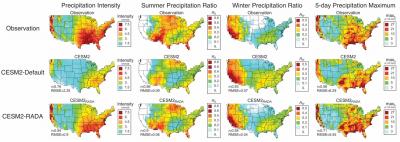Learning to Correct Climate Projection Biases
Scientists at Lawrence Livermore National Laboratory developed a Regularized Adversarial Domain Adaptation (RADA) deep learning methodology by leveraging a game-theory inspired deep learning approach, i.e., the generative adversarial neural networks (GANs), to improve climate projections. This is achieved through having the neural networks to distinguish climate simulations from observations and then correct projected simulations. The RADA methodology overcomes several deficiencies in existing bias correction models to ensure spatiotemporal consistency and inter-field correlations. An application to daily precipitation projections over the contiguous United States shows that this methodology can correct a broad range of statistics of daily precipitation and significantly improve the prediction skills in precipitation.
The RADA methodology offers a powerful tool for disentangling model parameterization biases from their interactions with the chaotic evolution of climate dynamics, opening a novel avenue toward big-data-enhanced climate predictions.
Accurate climate prediction is crucial for understanding climate change and implementing effective climate adaptation strategies. However, climate models that are used to generate climate predictions have multifaceted biases that often need to be corrected before predictions can be considered usable. In this study, LLNL scientists developed a data-driven methodology that detects and corrects climate model biases using a game theory-inspired machine learning technique. By applying physical and statistical constraints, the predictions are not only more accurate but also more trustworthy as judged by the physical understandings.

